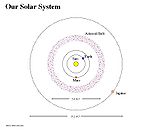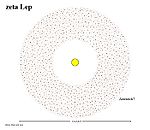廁增七
| 觀測資料 曆元 J2000.0 | |
|---|---|
| 星座 | 天兔座 |
| 星官 | 參宿 廁 |
| 赤經 | 05h 46m 57.34096s[1] |
| 赤緯 | −14° 49′ 19.0199″[1] |
| 視星等(V) | 3.524[2] |
| 特性 | |
| 光譜分類 | A2 IV-V(n)[3] |
| U−B 色指數 | +0.113[2] |
| B−V 色指數 | +0.114[2] |
| 天體測定 | |
| 徑向速度 (Rv) | 20.0[4]–24.7[5] km/s |
| 自行 (μ) | 赤經:-14.54[1] mas/yr 赤緯:-1.07[1] mas/yr |
| 視差 (π) | 46.28 ± 0.16[1] mas |
| 距離 | 70.5 ± 0.2 ly (21.61 ± 0.07 pc) |
| 詳細資料 | |
| 質量 | 1.46[6] M☉ |
| 半徑 | 1.5[7] R☉ |
| 表面重力 (log g) | 4.41[8] |
| 亮度 | 14[8] L☉ |
| 溫度 | 9,772[9] K |
| 金屬量 [Fe/H] | –0.76[3] dex |
| 自轉速度 (v sin i) | 245[7] km/s |
| 年齡 | 231+126 −181[9] Myr |
| 其他命名 | |
| 參考資料庫 | |
| SIMBAD | 資料 |
| ARICNS | 資料 |
廁增七,即天兔座ζ(Zeta Leporis、ζ Lep、ζ Leporis)是一顆距離地球約70.5光年(21.6秒差距)的恆星,位於天兔座,視星等3.5。[2]。2001年在它的周圍發現星周盤,相當於太陽系的小行星帶。
恆星狀態
[編輯]廁增七的光譜類型是 A2 IV-V(n)[3],代表它即將從A型主序星轉變成次巨星。附加的 (n) 表示在光譜中有吸收線存在。又因為它的投影自轉速度高達245 km/s(赤道真實自轉速度的下限),都卜勒效應使譜線變寬[7]。
廁增七的質量大約是太陽的1.46倍[6] ,半徑大約是太陽的1.5倍[7],光度則是太陽的14倍[8]。它的金屬量只有太陽的17%[3],因此它是只有大約2.31億年的年輕恆星,但誤差範圍在0.5到3.47億年之間[9]。
可能的小行星帶
[編輯]1983年紅外線天文衛星以紅外線觀測廁增七,確認有塵埃圍繞。它的岩屑盤延伸到距離恆星12.2天文單位的距離[11]。
2001年凱克天文台使用短波光譜儀進行更高精確度的觀測,進一步確定該岩屑盤延伸到5.4天文單位處[11]。盤內塵埃的溫度大約是340 K[來源請求]。因為考慮到來自恆星輻射的加熱,該岩屑盤的內緣可能距離廁增七約2.5天文單位[11]。
現在有科學家[誰說的?]相信這些塵埃是來自環繞廁增七的大規模小行星帶,因此可能是第一個在太陽系以外發現的小行星帶。該岩屑盤的質量大約是太陽系小行星帶的200倍,或4×1023 kg(超過月球質量的一半)。Christine Chen 和 Michael Jura 發現帶內的塵埃應該會在2萬年內落入恆星,這遠低於母恆星的壽命,因此可能有機制隨時補充帶內的塵埃[11]。該岩屑盤的年齡大約是3億年[來源請求]。
| 成員 (依恆星距離) |
質量 | 半長軸 (AU) |
軌道周期 (天) |
離心率 | 傾角 | 半徑 |
|---|---|---|---|---|---|---|
| 小行星帶 | 2.5 — 6.1 AU | — | — | |||
與太陽距離變化
[編輯]Bobylev 自2010年開始的計算顯示,廁增七在86.1萬年前曾距離太陽只有4.17光年(1.28秒差距)[5]。García-Sánchez 在2001年則指出在1百萬年前它距離太陽只有5.34光年(1.64秒差距)[4]。
參見
[編輯]參考資料
[編輯]- ^ 1.0 1.1 1.2 1.3 1.4 van Leeuwen, F. Validation of the new Hipparcos reduction. Astronomy and Astrophysics. November 2007, 474 (2): 653–664. Bibcode:2007A&A...474..653V. doi:10.1051/0004-6361:20078357.
- ^ 2.0 2.1 2.2 2.3 Gutierrez-Moreno, Adelina; et al, A System of photometric standards 1, Publicaciones Universidad de Chile, Department de Astronomy: 1–17, 1966, Bibcode:1966PDAUC...1....1G
- ^ 3.0 3.1 3.2 3.3 Gray, R. O.; et al, Contributions to the Nearby Stars (NStars) Project: spectroscopy of stars earlier than M0 within 40 pc-The Southern Sample, The Astronomical Journal, July 2006, 132 (1): 161–170, Bibcode:2006AJ....132..161G, arXiv:astro-ph/0603770
 , doi:10.1086/504637
, doi:10.1086/504637
- ^ 4.0 4.1 García-Sánchez, J.; Weissman, P. R.; Preston, R. A.; Jones, D. L.; Lestrade, J.-F.; Latham, D. W.; Stefanik, R. P.; Paredes, J. M. Stellar encounters with the solar system. Astronomy and Astrophysics. 2001, 379 (2): 634–659. Bibcode:2001A&A...379..634G. doi:10.1051/0004-6361:20011330.
- ^ 5.0 5.1 Bobylev, Vadim V. Searching for Stars Closely Encountering with the Solar System. Astronomy Letters. March 2010, 36 (3): 220–226. Bibcode:2010AstL...36..220B. arXiv:1003.2160
 . doi:10.1134/S1063773710030060.
. doi:10.1134/S1063773710030060.
- ^ 6.0 6.1 Shaya, Ed J.; Olling, Rob P., Very Wide Binaries and Other Comoving Stellar Companions: A Bayesian Analysis of the Hipparcos Catalogue, The Astrophysical Journal Supplement, January 2011, 192 (1): 2, Bibcode:2011ApJS..192....2S, doi:10.1088/0067-0049/192/1/2
- ^ 7.0 7.1 7.2 7.3 Akeson, R. L.; et al, Dust in the inner regions of debris disks around a stars, The Astrophysical Journal, February 2009, 691 (2): 1896–1908, Bibcode:2009ApJ...691.1896A, doi:10.1088/0004-637X/691/2/1896
- ^ 8.0 8.1 8.2 Malagnini, M. L.; Morossi, C., Accurate absolute luminosities, effective temperatures, radii, masses and surface gravities for a selected sample of field stars, Astronomy and Astrophysics Supplement Series, November 1990, 85 (3): 1015–1019, Bibcode:1990A&AS...85.1015M
- ^ 9.0 9.1 9.2 Song, Inseok; et al, Ages of A-Type Vega-like Stars from uvbyβ Photometry, The Astrophysical Journal, February 2001, 546 (1): 352–357, Bibcode:2001ApJ...546..352S, arXiv:astro-ph/0010102
 , doi:10.1086/318269
, doi:10.1086/318269
- ^ Gliese 217.1. SIMBAD Astronomical Object Database. Centre de Données astronomiques de Strasbourg. [2010-03-19]. (原始內容存檔於2020-11-05).
- ^ 11.0 11.1 11.2 11.3 Morledge, Paul. Tightening a Star's Belt. Astronomy (Kalmbach Publishing). November 2001, 29 (11): 26 [2012-07-18]. ISSN 0091-6358. (原始內容存檔於2020-11-05).
延伸閱讀
[編輯]- Cote J. B and A type stars with unexpectedly large colour excesses at IRAS wavelengths. Astronomy and Astrophysics. 1987, 181 (1): 77–84. Bibcode:1987A&A...181...77C.
- Aumann H. H., Probst R. G. Search for Vega-like nearby stars with 12 micron excess. Astrophysical Journal. 1991, 368: 264–271. Bibcode:1991ApJ...368..264A. doi:10.1086/169690.
- Chen C. H., Jura M. A Possible Massive Asteroid Belt around zeta Leporis. Astrophysical Journal. 2001, 560 (2): L171. Bibcode:2001ApJ...560L.171C. arXiv:astro-ph/0109216
 . doi:10.1086/324057.
. doi:10.1086/324057. - M. M. Moerchen, C. M. Telesco, C. Packham, T. J. J. Kehoe. Mid-infrared resolution of a 3 AU-radius debris disk around Zeta Leporis. Astrophysical Journal Letters. 2006, 655 (2): L109. Bibcode:2007ApJ...655L.109M. arXiv:astro-ph/0612550
 . doi:10.1086/511955.
. doi:10.1086/511955.
外部連結
[編輯]- Britt, Robert Roy. Asteroid Belt Like Ours Spotted Around Another Star. SPACE.com. 2001-06-04 [2008-06-26]. (原始內容存檔於2008-05-12).
- UCLA astronomers identify evidence of asteroid belt around nearby star: Findings indicate potential for planet or asteroid formation (頁面存檔備份,存於網際網路檔案館), 2001.
- Zeta Leporis. Extrasolar Visions. [2008-06-26]. (原始內容存檔於2010-10-07).
- Zeta Leporis Asteroid Belt. Extrasolar Visions. [2008-06-26]. (原始內容存檔於2010-10-07).
- Zeta Leporis. SolStation. [2008-06-26]. (原始內容存檔於2020-11-21).
- Wikisky image (頁面存檔備份,存於網際網路檔案館) of Zeta Leporis



